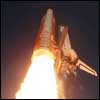Three weeks ago they held a funeral for Galileo. Well, not exactly a funeral; it was more of a farewell celebration, a tribute by the hundreds of people who had spent years working with him. There was sadness there, but also gratefulness, for all that Galileo had accomplished. As Dr. Claudia Alexander, a close associate, expressed it, Galileo was "worth his weight in gold."
Such attention and nostalgia might lead us to think that Galileo was one of those perfectly behaved creatures, unerringly following the prescribed program. Well actually, no. In fact, Galileo was uncooperative from the very start, and it was kind of downhill from there.
The NASA space probe Galileo was conceived in 1977 and scheduled to be launched in 1982 , but takeoff was repeatedly delayed, first by technical difficulties and then by the Challenger disaster. Finally, in 1989, Galileo was attached to the shuttle Atlantis and sent to outer space. The change of plans necessitated a roundabout route, by which it took him six years to reach the planet Jupiter instead of the originally planned two and a half. When the control team finally got him, in 1995, where they wanted him — orbiting Jupiter — they realized that he wouldn't be able to transmit his findings because his major antenna had failed to unfurl. At one point he was subjected to such intense radiation from a little Jovian moon that his tape recorder got completely stuck. These initial difficulties seemed to indicate that the billions of dollars poured into Galileo would be for naught and his mission would be a failure.
So why the upbeat mood when Galileo's friends gathered in a Pasadena lab on September 21, 2003 to hear his final radio signal as he plunged into Jupiter's atmosphere? Because, in all the history of space exploration, Galileo is counted amongst the most successful satellite missions. His 14-year journey was plagued by one crisis after the next, yet somehow, a way was found to bypass or overcome them. In the end, he actually got to his destination, an alternative data transmission system was set up, and his controllers managed to get that tape recorder unstuck by switching it on and off dozens of times. By the time his mission came to an end, Galileo sent us 14,000 pictures (many of them the breathtaking photos that have redefined our vision of outer space), uncovered incredible phenomena on Jupiter's four major moons, witnessed a comet crash, and discovered the first known asteroid with its own moon — "priceless information," in the words of one scientist, "the kind that forwards our knowledge."
Now, I am no Galileo, but somehow it's comforting to think of the little guy zooming blindly around our solar system at 8,000 miles an hour, mostly in directions that seem to be opposite of his intended destination, being zapped by radiation and knowing just when to protect himself and shut down all his systems — and actually getting some useful things done.
And the scientists are no G‑d, but it's comforting to think about a bunch of guys giving a not-so-gentle nudge to swing a spacecraft into a higher orbit, reprogramming systems from millions of miles away in ways that they were never designed to be used, and sending little electronic jolts to unstuck a crucial bit of tape. Of them encountering endless complications with their creation, yet loving him more because of it.
And when I think about oblivious Galileo, zipping about, insentient to his near moon collisions, (like I said, I am no Galileo, so I am always bumping into moons, not just missing), bewildered by the sudden lurches in his trajectory, and discombobulated by shocks that seem to come from nowhere, I feel a kind of empathy. But I also feel a kind of joy, because despite all this, or rather, because of it, Galileo performed better than our wildest expectations, and although Galileo remained forever incognizant of the careful manipulation of his path, suddenly, I am.
And when I think about the scientists, doing everything in their power to make the mission successful, and indeed accomplishing marvelous things for science and knowledge, and then realizing finally (like I said, they're no G‑d) that not all obstacles are surmountable and the mission would come to an end with Galileo's collision with Jupiter, I feel a kind of sympathy. But I also feel a kind of joy, because the scientists have demonstrated for me the unseen hand that guides my path, and that for all that they've done, their powers are limited, because they're no G‑d. But G‑d is.







re Galileo This is beautifully written. If an article can be rich, this one definitely is. In addition to its style, it has information, it has humor, it's so interesting! - and it contains a number of messages with the main one at the very end.
Thank you so much for writing this.